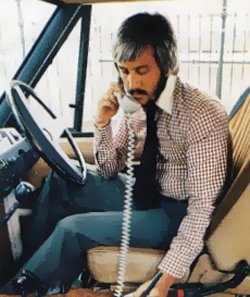
The man is driving an early Range Rover; the angle of the
windscreen gives it away. Note that he probably isn't going off-road,
because he's not wearing wellies. It's possible that he has taken them off
in order to use the pedals, in which case the interior of the Range Rover
probably smells a bit.
This man's fashion sense was old-fashioned
in 1983, but technical people are allowed to wear odd clothes because we
need them. That said, we tend to think of the past as a series of discrete
intervals, between which everything was thrown away, but there's no reason
why this fellow shouldn't have continued to look like Man of 1974 into the
age of Thatcher if he wanted to. The recent spate of 'I Love...'
television shows reinforce this arbitrary packaging of the past - things
that appear in one year are forgotten the next, which just doesn't
happen.
Moustaches were well and truly on the way out in the 80s,
even in the north. The only people on television who had moustaches were
the soldiers in the Falklands, and Dickie Davies. Moustaches never made a
comeback, although David Seaman's doesn't look too bad. Goatees were quite
trendy in the mid-90s but are now also quite dated. Facial hair, in
general, is bad form unless you're from the Middle East, which seems odd
given that it's so hot over there; you'd think a clean face would keep
their chins cool.
The subject of this article is in-car telephony,
as opposed to in-car radiophony, which had been around for decades. The
article mentions CB radio, which didn't really take off in the UK on
account of the UK being miserable, tiny, and poor. In-car telephony was
achieved in 1983 with British Telecom's 'Telecom Radiophone' system, a
clumsy (and presumably quite expensive) operation that involved radioing
an operator who would then connect you to the telephone
network.
"A completely new 'cellular' mobile phone system is due
to be set up during the next two or three years by Telecom, in partnership
with Racal Millicom."
And indeed it was. It was 'proper'
telephony, and it steadily grew until about 1997, at which point it
exploded. Nowadays, everybody owns on average three mobile phones.
Children own mobile phones. Old people own mobile phones. People in the
Middle East own mobile phones. Telephone boxes still exist, but are in
terminal decline except as means of advertising prostitutes, or
weeing.
British Telecommunications PLC had been spun off from the
Post Office in 1980 and was privatised in 1984, to much hoo-ha about
Thatcher's insane policies wrecking Britain's family jewels, etc. The
privatisation netted the government eighteen thousand million billion
pounds and helped fund Nigel Lawson's tax-cutting budgets of the late-80s.
British Telecom is now an extremely profitable company, albiet from the
position of a near-monopoly, and there is nothing left to privatise apart
from the Post Office itself, which nobody wants, and the NHS, which has a
great sentimental hold on the British public, as did all the old
nationalised industries. And the BBC, people like that. Except for the
Tories, who hated it, and still do.